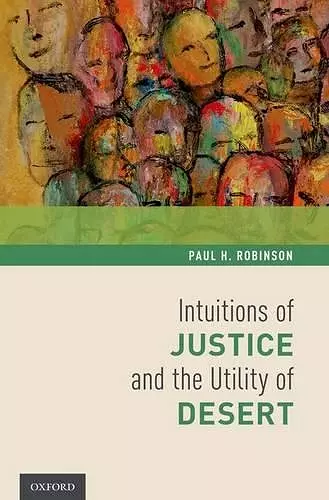Intuitions of Justice and the Utility of Desert
Format:Hardback
Publisher:Oxford University Press Inc
Published:23rd May '13
Currently unavailable, and unfortunately no date known when it will be back

Research suggests that people of all demographics have nuanced and sophisticated notions of justice. In this intriguing new book, Paul H. Robinson demonstrates that judicial decisions that deviate from public conceptions of justice and desert can seriously undermine the American criminal justice system's integrity and legitimacy by failing to recognize or meet the needs of the communities it serves. Intuitions of Justice and the Utility of Desert sketches the contours of a wide range of lay conceptions of justice, touching many if not most of the issues that penal code drafters or policy makers must face, including normative crime control, universal understandings of justice, culpability, principles of adjudication, grading sentencing, justification defenses, and judicial discretion. Robinson warns that compromising the American criminal justice system to satisfy other interests can uncover hidden the costs incurred when a community's notions about justice are not reflected in its criminal laws. By ignoring the intuitions of justice held by the communities they serve, legislators, policymakers, and judges undermine the relevance of the criminal justice system and reduce its strength and legitimacy, creating a gap between what justice a community needs and what justice a court or law prescribes.
"This remarkable book is the fruit of a two-decades-old project pioneered by Paul Robinson and his collaborators into the moral intuitions behind our criminal law. It reveals that our intuitions about who and what deserves to be punished, and how much, are remarkably precise and universally shared. He offers intriguing speculations as to why that might be so and shows that legislators who try to make up laws that go against those intuitions-as they habitually do in the name of populist or pragmatic considerations-wreak great havoc with our system." --Leo Katz, Frank Carano Professor of Law, University of Pennsylvania Law School "A defining work on the ideal distributive principles for punishment. It is undoubtedly one of the best books I have recently read. Its highly rational approach, with radical new thinking, is important for both legislators and criminal law researchers. This book will provide important insights to the changing landscape of modern criminal theory." --Zhao Bingzhi, President and Professor, Chinese Criminal Law Society "No criminal law theorist has done more than Paul Robinson to employ sophisticated techniques of social science to discover what laypersons think about the fairness of various rules and doctrines in the substantive criminal law. In extraordinarily readable prose, Robinson argues that efforts to ensure that our penal law conforms to the judgments of laypersons will help to produce a criminal law that is beneficial to us all." --Doug Husak, Professor II, Department of Philosophy, Rutgers University "The book draws upon several empirical studies, undertaken by Robinson and collaborators, into aspects of lay understanding, law intuitions and lay opinions. The result is a volume that raises challenging questions about the role of the public in criminal law doctrine and in sentencing principles, written with Robinson's characteristic clarity and persuasiveness." --Andrew Ashworth, Vinerian Professor of English Law, University of Oxford
ISBN: 9780199917723
Dimensions: 157mm x 231mm x 36mm
Weight: 957g
584 pages